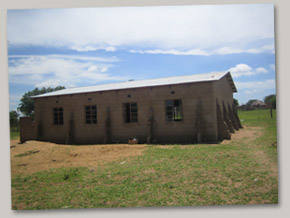Main menu
Content menu
Work done in Swaziland, Malawi and Angola
Swaziland
One is a PCR/DNA, which is used to diagnose Aids in under 18s. This means it is possible to
detect the illness an early stage and thus supply treatment. The other is a CD4, which checks a
person’s defences and whether there is a need for antiretroviral treatments.
 23 new Community Support Centres
have been built, which provide integral aid to 1,000 children at risk, especially orphans in rural
areas. The centres offer nutrition and psychosocial support. To look after the orphaned children
and oversee the centres, almost 900 caregivers have been trained.
23 new Community Support Centres
have been built, which provide integral aid to 1,000 children at risk, especially orphans in rural
areas. The centres offer nutrition and psychosocial support. To look after the orphaned children
and oversee the centres, almost 900 caregivers have been trained.
Toilets and 17 new drinking water wells have been built at schools. This stops children from
drinking unhealthy water, which they often share with animals.
New resources have been supplied to several rural clinics and communities have been made more
aware of the dangers of Aids and its devastating effects, and people have been encouraged to attend
centres for tests and monitoring.
The registration of children has been encouraged in order to attend to newborns better.
Although the system already existed, is was not standardised. 12,000 new children in 120
communities have now been registered.
At 100 schools a programme has been set up that uses sport as an educational tool. This helps
young people to feel more integrated in their communities and learn the right skills for a healthy
life and to respect their own rights.
Thanks to the support from FC Barcelona to the Unicef programmes, over 15,000 women had the
aids test –approximately 60% of all pregnant women–, and 80% of those detected as HIV
positive received treatment. Almost 2,000 children are receiving the adequate treatment to prevent
infections, and an important number of them are also receiving antiretroviral treatment.
Malawi
In Malawi, 550,000 children out of the 3 million younger than 5 years are currently orphans
because of HIV/AIDS. Thanks to the support programme of FC Barcelona with Unicef, centres were
created where the less affected families and the community can take care of the most vulnerable
children and return them a little of the childhood and happiness that their hard living conditions
has taken away from them.
The carers were also provided with training in order for them to attend to the psychosocial
needs of the orphans and vulnerable children, and volunteer networks were created to support the
families that have suffered losses due to aids.
Angola
Angola is one of the few countries in southern Africa were the prevalence of aids
is relatively low (2.1%). Notwithstanding, the large amount of young population (48% is under 25)
fears a fast expansion of the epidemic in the upcoming years. Therefore, a great project for the
prevention of aids through the practice of sport, especially football, is being carried out
together with the Angolan Football Federation, through visibility campaigns carried out during
sport tournaments, theatre plays and shows.





